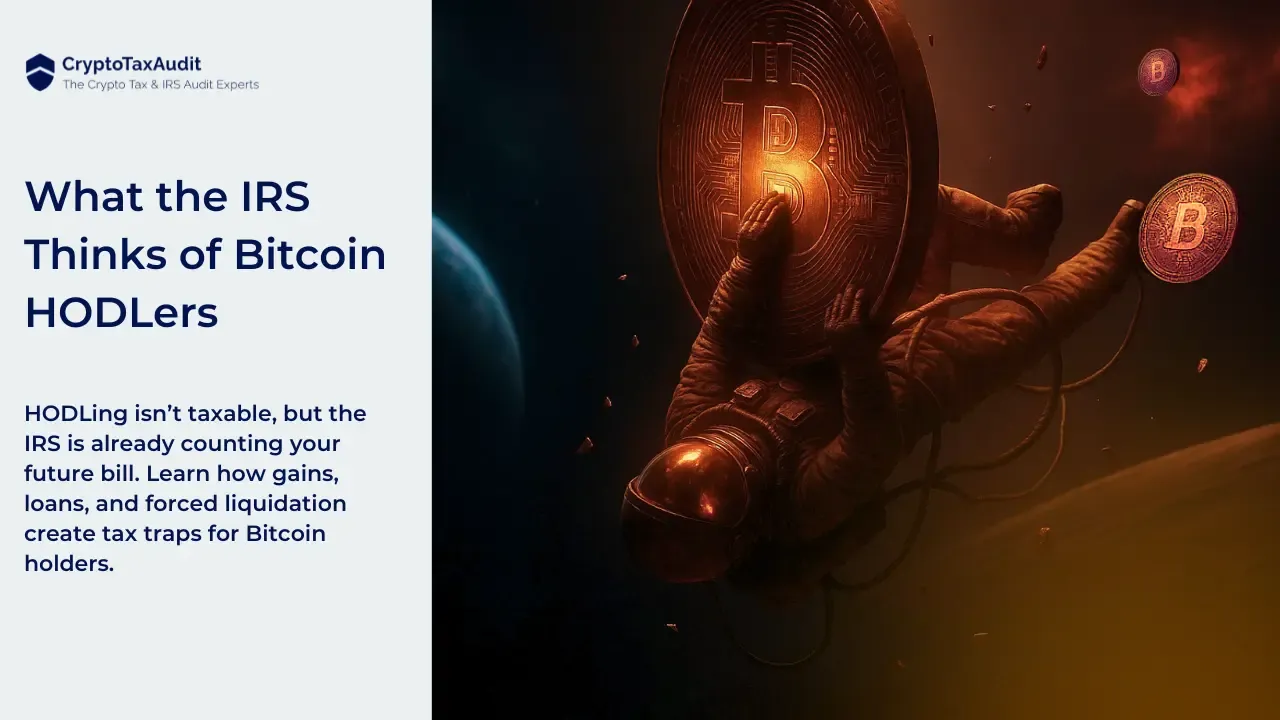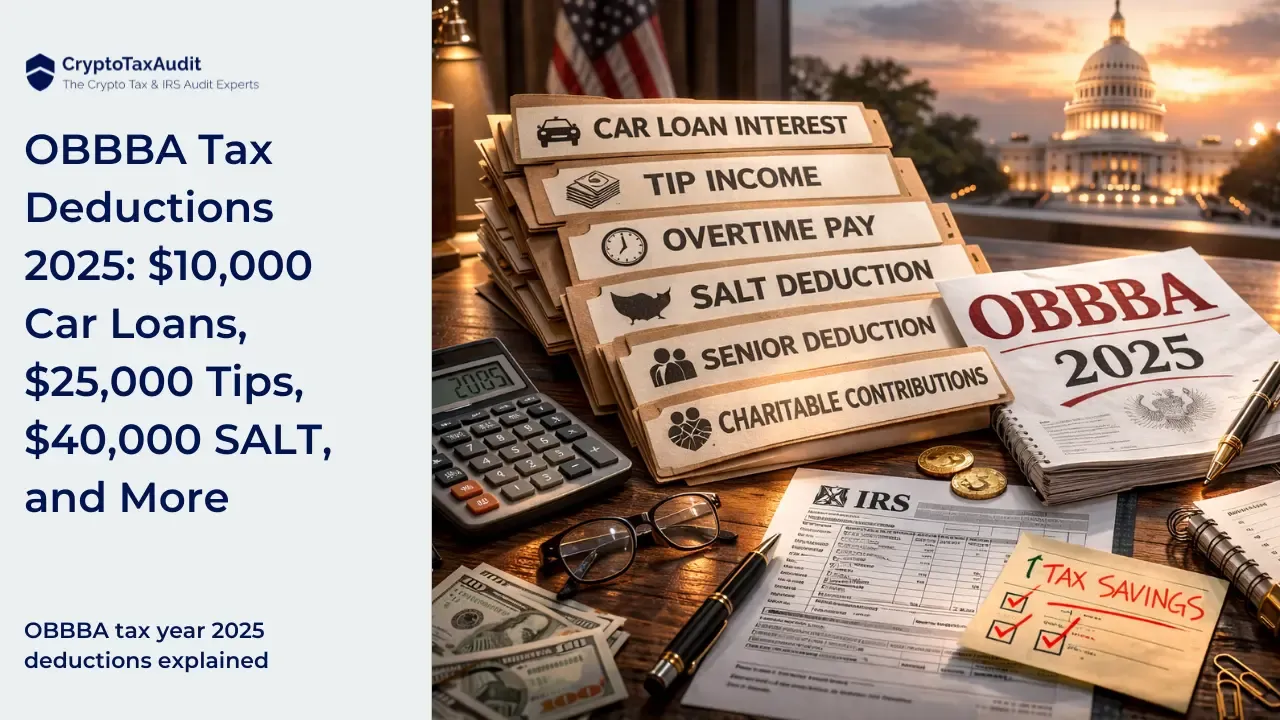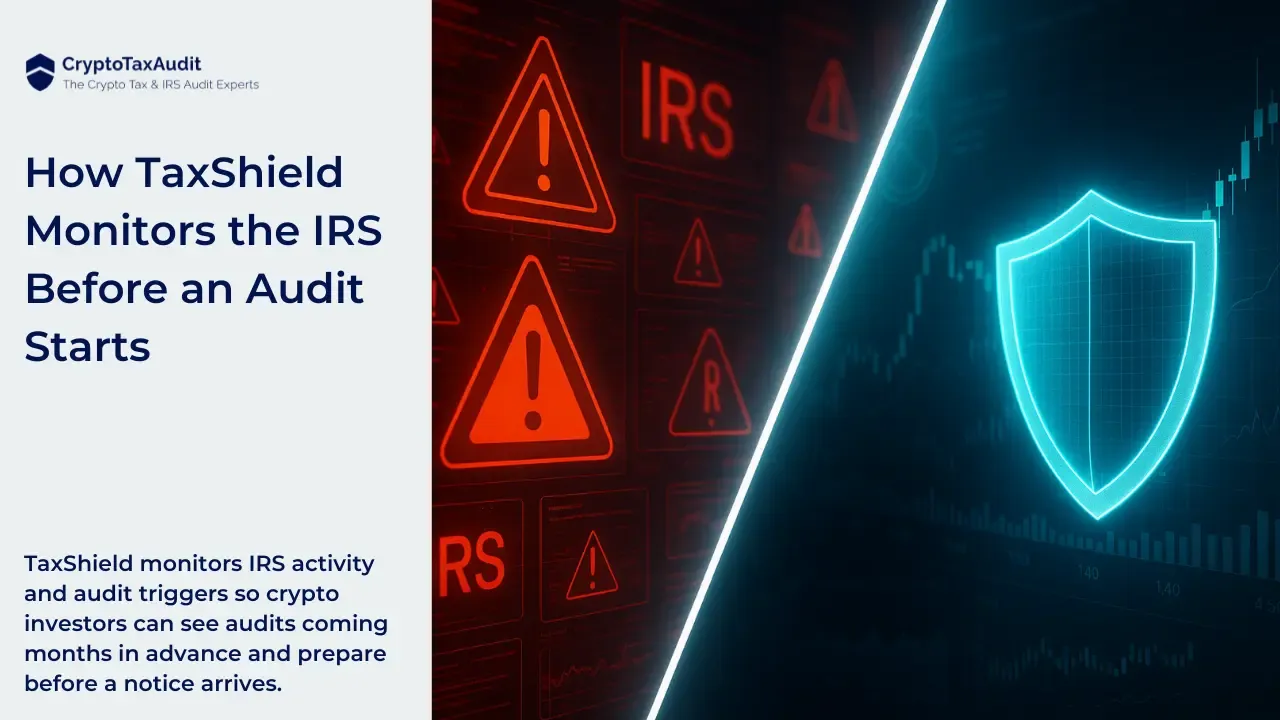
So You're a Bitcoin HODLer… Here's What the IRS Thinks of That
By Clinton Donnelly, CEO, Founder | CryptoTaxAudit
You bought Bitcoin at $8,000. Now it's $95,000. Your plan? HODL forever.
No selling. No taxes. Just watch that number go up.
But here's the problem: the IRS is already counting your future tax bill.
And if you're thinking about borrowing against your Bitcoin instead of selling it, that's a whole different tax trap.
Key Takeaways
- HODLing Bitcoin creates no tax liability until you sell
- When you do sell, expect 15-24% federal capital gains tax plus state taxes
- Borrowing against Bitcoin avoids taxes today but creates expensive debt (12-15% interest)
- Forced liquidation from a collateral call is still a taxable sale
- You should consider outside income to repay crypto-backed loans without selling
What Happens When You Finally Sell Your Bitcoin?
Let's say you bought one Bitcoin years ago and it's grown into serious money.
The moment you sell, the IRS wants its cut.
For Bitcoin held over one year, you'll pay long-term capital gains tax at 15% or 20% depending on your income.
But that's not all.
Add another 3.8% for the Net Investment Income Tax under Section 1411.
Then your state takes a piece.
Total damage? Somewhere between 20% and 33% of your profit.
On a $500,000 gain, that's $100,000 to $165,000 gone.
You need to plan for this before you click "sell."
Can You Borrow Against Bitcoin Instead?
Yes.
And a lot of people are doing it.
Here's how it works: you deposit your Bitcoin with a lending platform.
They give you cash equal to one-third to one-half of your Bitcoin's value.
Your Bitcoin stays locked up as collateral.
The upside? No taxable event.
The IRS treats this as a loan, not a sale. You get cash. You keep your Bitcoin. No 1099 form appears.
When you pay back the loan, it is still not a tax event.
Sounds perfect, right?
The Problem With Crypto-Backed Loans
First, those interest rates are brutal.
We're talking 12% to 15% in most cases. Compare that to a 7% mortgage.
You're paying double to borrow against an asset you already own.
Why so high?
Because, despite what Bitcoin maximalists say, lenders see crypto as risky collateral.
Second, you eventually have to pay that loan back.
Your Bitcoin might be climbing in value the whole time you're paying interest. But that loan still comes due.
What are you going to do then? Sell Bitcoin to pay it off?
If you do, you're right back to facing capital gains tax. Plus you paid 12-15% interest for the privilege of delaying it.
Before you borrow or sell, let CryptoTaxAudit run the math so you know exactly what you’re risking.
What Happens If Your Collateral Gets Liquidated?
Here's where it gets nasty.
Bitcoin drops 40% in a week. Your lender issues a margin call. You can't add more collateral.
They liquidate your position.
The IRS calls that a disposition under IRC Section 1001. It's a taxable sale even though you didn't choose to sell.
You bought Bitcoin at $10,000. It got liquidated at $60,000 during the crash.
You just recognized a $50,000 gain.
You owe taxes on that $50,000 even though you got nothing out of the deal except a wiped-out loan.
Forced liquidation doesn't erase your tax bill. It creates one.
The Smart Way to Pay Back Crypto Loans
If you're borrowing against Bitcoin, consider using outside money to pay back the loan.
Income from your job. Profits from your business. Anything that isn't selling crypto.
Because if your repayment strategy is "sell Bitcoin when the loan is due," you're just creating a tax problem with extra steps. And you paid 12-15% interest to do it.
The whole point of borrowing against Bitcoin is to avoid selling it. Don't ruin that by selling it anyway.
When Does HODLing Actually Make Sense?
HODLing works when you truly don't need the money.
You're not borrowing against it. You're not checking the price every day.
You're treating it like a 20-year investment that you'll either pass to your heirs or sell in retirement when your income is lower.
At that point, your capital gains rate might drop.
And if you die HODLing it, your heirs get a step-up in basis under IRC Section 1014, which erases the capital gain entirely.
But if you need money before then, either sell and pay the tax, or borrow and pay the interest. Both strategies cost you. Pick the cheaper one based on your specific numbers.
FAQ: Bitcoin HODLing and Taxes
Q: If I never sell my Bitcoin, do I owe taxes on it?
A: No. HODLing creates no tax liability. The IRS only taxes you when you dispose of property. As long as you hold, you pay nothing. When you need help planning your exit strategy, CryptoTaxAudit can calculate exactly what you'll owe.
Q: Is borrowing against Bitcoin really tax-free?
A: Yes. A loan backed by Bitcoin is not a taxable event under current IRS guidance. You receive cash, but it's debt, not income. You owe nothing until you sell or get liquidated. If you're unsure whether your specific loan arrangement qualifies, CryptoTaxAudit can review it.
Q: What if I use Bitcoin as collateral and it gets liquidated?
A: That's a forced sale. You recognize capital gains based on the difference between your cost basis and the liquidation price. Even though you didn't choose to sell, the IRS treats it as a disposition. CryptoTaxAudit handles these complicated liquidation scenarios.
Q: Can I deduct the interest on a crypto-backed loan?
A: Only if you used the loan proceeds for business or investment purposes, and even then it's limited under IRC Section 163(d). Personal interest isn't deductible. Using a loan to buy a car or pay bills? You can't deduct that interest.
Q: What's the capital gains rate on Bitcoin held less than a year?
A: Short-term capital gains are taxed as ordinary income. That could be 37% federal plus 3.8% NIIT plus state taxes. You could lose nearly half your profit. Hold for at least 12 months to qualify for long-term rates.
Q: Should I borrow against Bitcoin or just sell it?
A: Run the numbers. If you're paying 12% interest on a loan and your capital gains rate is 24%, selling is cheaper if you're paying off the loan within two years. If Bitcoin is climbing fast enough to offset that 12% cost, borrowing wins.
Q: What happens to my Bitcoin taxes when I die?
A: Your heirs receive a step-up in basis under IRC Section 1014. If you bought Bitcoin at $1,000 and it's worth $100,000 when you die, your heirs inherit it at a cost basis of $100,000. They can sell immediately with zero capital gains tax. That's the ultimate HODL strategy-it's a generational strategy, and CryptoTaxAudit can help.
The Bottom Line
HODLing Bitcoin is a tax strategy. Not selling means not paying taxes.
But eventually, you'll need money. When that day comes, you'll either sell and pay capital gains tax or borrow and pay interest.
Both cost you. The question is which costs less.
If you're sitting on large gains and you're not sure how to handle it, don't guess. The IRS doesn't accept "I thought this was okay" as a defense.
We handle thousands of crypto tax cases every year. We know what works and what gets people audited.
If you need help planning your exit, calculating your tax bill, or defending a position you've already taken. Talk to us because the worst tax plan is no tax plan at all.





